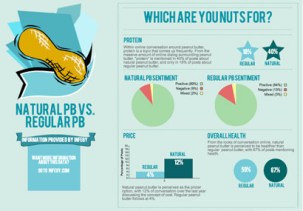 Packed with protein and ingredients to keep hunger at an arm’s length, peanut butter has been a long-time family favorite, especially with moms and kids. In the last few years, a debate around the health benefits of natural peanut butter versus regular peanut butter has begun. Is peanut butter marked “natural” actually better for you, or just marketed to an audience trying to go the organic route?
Packed with protein and ingredients to keep hunger at an arm’s length, peanut butter has been a long-time family favorite, especially with moms and kids. In the last few years, a debate around the health benefits of natural peanut butter versus regular peanut butter has begun. Is peanut butter marked “natural” actually better for you, or just marketed to an audience trying to go the organic route?
Using Social Radar, we see that online conversation around both types of peanut butter turns up about 4.7 million posts in the last year. Within this huge amount of social data, there are a few topics that stick out: protein, health, and price. We found that while dialog around regular PB is higher than its natural counterpart, people talking online think natural peanut butter is the healthier of the two.
When looking into which variety has more protein, 40 percent of conversation around natural peanut butter mentions protein, compared to 18 percent of conversation around regular peanut butter. Natural PB comes out on top with the topic of overall health as well. Sixty-seven percent of posts about natural PB are around the topic of health, compared to 59 percent of posts about regular peanut butter.
When it comes to the price, regular PB takes the cake as the cheaper option with four percent of conversation discussing the concept of cost, as opposed to 12 percent surrounding natural peanut butter.
From this social data, we see people talking online perceive natural PB as the healthier, more expensive option, with a higher protein content. So, is this true? Not necessarily.
Dr. Dale Brigham, Teaching Associate Professor of Nutrition & Exercise Physiology at the University of Missouri, says depending on the brand of peanut butter, the amount of calories, protein, vitamins, and minerals is most likely equivalent for both products. He says the health difference lies in the trans fats.
“Trans fats do the “double whammy” of increasing heart disease risk by lowering HDL, the good cholesterol, and raising LDL, the bad cholesterol,” says Dr. Brigham. “Even if regular peanut butter has a label that states “zero grams trans fat,” it can contain up to 0.5 grams of trans fats per serving (rounded down to zero on the food label).”
Because nutritionists recommend consuming zero trans fats, Dr. Brigham says natural peanut butter is generally healthier overall than regular peanut butter. Regular (hydrogenated) peanut butter also has more saturated fats than natural peanut butter, which may increase LDL cholesterol and heart disease risk.
So, the next time you head to the grocery store for some PB, Dr. Brigham suggests comparing the nutrition labels because every brand is different.
Infegy is a market research company headquartered in Kansas City, MO dedicated to analyzing public opinion about a variety of subjects, issues and events so businesses can better understand consumers.







Comments
Comments